|
Welcome to NRLI, Class XVII!
|
|
|
Sending Well Wishes Post-Hurricane Irma
Dear NRLI alumni, partners, friends, and family,
You have been in our thoughts over the past couple of weeks. We trust that you and your families are safe, and we send well wishes during recovery efforts.
All the best -- the NRLI Project Team
In Remembrance: Captain Donald  Voss Voss
It is with deep sadness that we announce the passing of Captain Donald Voss.
Captain Don was Co-Founder of One Florida Foundation, Inc. and an Alumnus of NRLI, Class XVI. The NRLI Project Team sends our deepest condolences to Captain Don's' family and friends, especially his wife Dyana who attended NRLI sessions with Don.
Click here to read a remembrance of Captain Don published in the TCPalm.
|
|
|
|
|
|
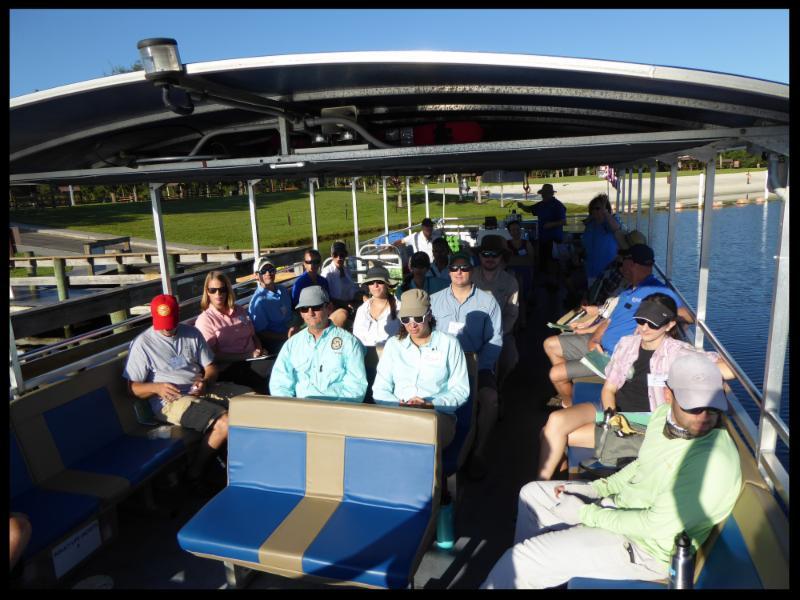
Fort Myers: Water Quality & Estuary Health
Class XVII Fellows traveled from Bainbridge, GA, West Palm Beach, FL, and many points inbetween to meet for the inaugural session of Class XVII in Fort Myers, FL, August 16-18, 2017. The issue focus was Water Quality & Estuary Health.
In addition to examining Caloosahatchee watershed issues, the 22 Fellows in this year's class began the year by
- learning about the NRLI curriculum;
- discussing Fellows' and Project Team goals and expectations;
- exploring the NRLI concept of leadership in natural resource management;
- examining the concept of stakeholders;
- participating in a discussion of natural resource issues and stakeholders in Florida; and
- experiencing techniques for creating positive group dynamics and an atmosphere of trust.
To get a first-hand feel for the area, Fellows embarked on a Caloosahatchee Riverlore Cruise with the Sanibel-Captiva Conservation Foundation (SCCF). The tour was led by Rae Ann Wessel, Natural Resources Policy Director for SCCF. Rae Ann shared her knowledge of the hydrological and social history of the Caloosahatchee River and how that fits in the present context of water quality concerns and the restoration work being done.
The informative tour was followed by an afternoon Q&A with a panel of local stakeholders, each representing a distinct perspective on the issues learned about during the cruise. Such panels area a core part of the NRLI program. At each monthly session, the Project Team invites 4-6 people who represent a range of viewpoints and have first-hand knowledge of the topic to share their knowledge and opinions with the group. In Fort Myers, the invited stakeholders included
- Roland Ottolini, Director, Natural Resources Division, Lee County;
- Gene McAvoy, County Extension Director and Regional Vegetable/Horticulture Extension Agent, UF/IFAS Extension Hendry County;
- Janet Starnes, Principle Project Manager, South Florida Water Management District;
- Ray Judah, Former Environmental Land Planner, Lee County Department of Community Development and Lee County Commissioner; and
- Jacki Liszak, Fort Myers Beach Chamber of Commerce President; Owner, Sea Gypsy Inn.
|
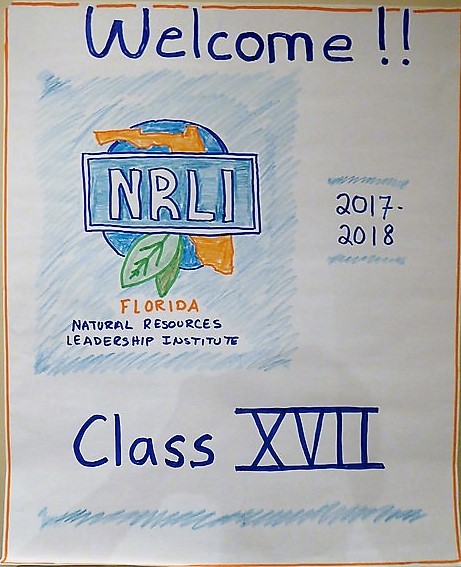 Fellows' Article:
Fellows' Article:
The Curious Case of the Caloosahatchee Coconuts
By Amy Fenwick Reaume and Charles Barrett
It was a hot August day, muggy and what could only be accurately described as sticky. We found ourselves in Lee County, Florida at the mouth of the Caloosahatchee River. Here we gathered to meet our cohort for the next nine months. It was unassuming at first, hardly a ripple on the water. It wasn't until we dove deeper that we began to realize what was actually in store for us...
Gathered to focus on the topic of Water Quality & Estuary Health while exploring the environmental issues surrounding the Caloosahatchee River, our first meeting was surprising and inspiring. In the matter of a few hours over twenty strangers became comfortable with each other, learning names to go with faces (after repeating "Graham, Kevin, Paloma, Tara, Caroline, Katie, Rebecca, Amy, Michael, Nia, Rachael, Liz, Mary, Brent, Derrell, Ed, Lisa, John, Charles, Barton, Rachael, Andrew" twenty-two times we had it down!).
We heard the back stories that brought us all together. We were shown that if you're willing to look for it, you can probably find something in common with even the most unlikely person. There were many instances where there were fewer than six-degrees of separation, but what's a few degrees
in that heat? It was surprising to feel comfortable so quickly and with such a large, diverse group.
It was quickly evident that by getting to know each other on a personal level, progress and productivity in working together was accelerated. This seemingly simple but invaluable lesson from our first NRLI session can be applied immediately to our work with stakeholders. It was interesting to see that although our pasts are different many of us have connections with each other. Many of these connections were unrealized until NRLI. We wondered if these were coincidences or if there was more to NRLI than what meets the eye...
We were reminded to think in a broader perspective than which we are typically conditioned. It was clear there were many different sets of values and worldviews brought to the table. We were taught to focus on the process and to be "hard on the issue and soft on the people." The issues surrounding the Caloosahatchee - the history, the stakeholders, the problems and the solutions are mirrored across Florida, across the country, across the planet.
During the fieldtrip on the Caloosahatchee, Rae Ann Wessel of Sanibel-Captiva Conservation Foundation shared stories of her longtime friend, Captain Charles. These tales emphasized being mindful of the history and human connections of an issue; they are important to understanding the complex dynamics at play. Also, these memories provide a baseline and reference point, and remind us not to let "history repeat itself."
The stakeholder panel was fascinating in the diversity of viewpoints regarding solutions, as well as the analysis by fellows following the panel. Listening to and addressing these varying perspectives is essential to the process. "You don't know what you don't know until you know it." Comprehending another perspective can be an enlightening experience, shedding light on alternative resolutions that may never have been reached without differing viewpoints. These tenets are wise and open the mind the same way the smell of the salt and the sea can take you back to childhood.
As the days progressed and the South Florida heat loomed ever present and suffocating, certain truths became more clear. The ability of our co-fellows to identify their perspectives and share them with everyone else was refreshing. Just like the Caloosahatchee, the oxbows in our minds have been straightened by the demands of our daily lives but with the teachings of NRLI we hope to increase our capacity for openness and mental flexibility. Reflecting on the overall experience and lessons learned from just the first session, a member of NRLI Class XVII commented, "I'm optimistic this program may change my life."
A final take-away from this first session is that we, as fellows, may find ourselves as stakeholders on an issue - on multiple levels. While our careers are focused on natural resources management, these issues are much more than a job to all NRLI fellows and alumni. We are all in this field because we're passionate about our work and are personally invested. We couldn't ask to be surrounded by a more committed, diverse group of individuals and look forward to working with the fellows of NRLI Class XVII and alumni to lead Florida to a brighter future!
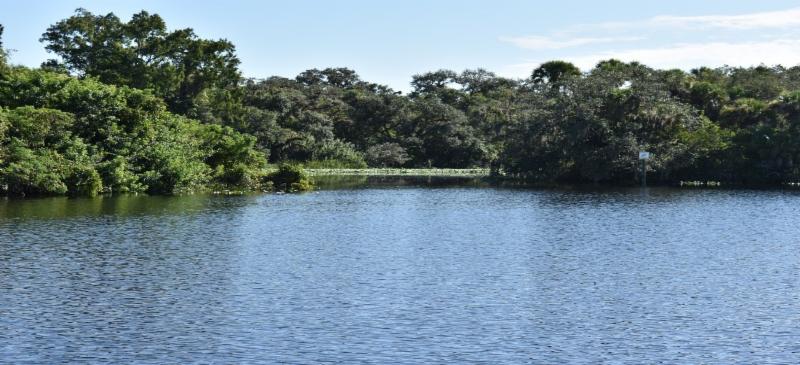
|
 |
|
 |
Image source: Univ. of Nebraska Press
|
NRLI Toolbox: Buzz Groups
When topics are controversial, people may fe
el exposed when asked to provide feedback to a large group and often tend to be more comfortable engaging in intimate discussions. Facilitators can use "buzz groups" to create a safe space for exchange, increase audience engagement, and liven up plenary sessions. In NRLI, we encourage the formation of small groups (two to four people) who are seated close to one another. Facilitators provide a specific discussion question or have individuals link what they hear to their own experiences. The "buzzing" sounds that expands across the room indicates that people are engaging in thought-provoking discussions. A decrease in these sounds signals that the group is nearing the end the activity. Facilitators can debrief the activity by inviting one or two pairs to share insights with the larger group. Alternative procedure: When topics are wrought with emotion or particularly complex, facilitators can ask everyone to write down their thoughts individually first, before sharing with neighbors. Such an approach is especially valuable for individuals who prefer time to think through their response before speaking.
|
|
Alumni Discussion
On Thursday afternoon, Jon and Joy facilitated a one-hour discussion session that introduced Fellows to the tremendous resource represented by the NRLI alumni network. The Project Team invited six alumni from four different NRLI classes who live in and around the area and whose work relates to water quality and estuary health.
- Maran Hilgendorf - GreenSync Inc., formally with Charlotte Harbor National Estuary Program (Class III)
- Gene McAvoy - UF/IFAS Hendry County Extension Director, Regional Vegetable Extension Agent (Class XIV)
- Jessica Mendes - UF/IFAS Food Systems Extension Agent, Collier County (Class XIV)
- Jacqui Thurlow-Lippisch - Former Mayor and Commissioner for Town Of Sewall's Point; now serving on Florida's Constitution Revision Commission (Class XV)
- Captain Donald Voss - Captain, Founder of One Florida Foundation, Inc. (Class XVI)
- Walter Cheatham - Education Coordinator at Calusa Nature Center and Planetarium (Class XVI)
Their expertise and experience helped expand the group's understanding of the issues beyond what was learned during the field trip and stakeholder panel. The discussion also revealed how these alumni remembered NRLI, how they specifically benefited from the program, and how they are applying their NRLI skills. This newly-created alumni session is one of a series of upcoming activities designed to strengthen and better tap into the NRLI network. Highlights and insights are documented below.
What we learned/Benefits of NRLI:
- We learned that NRLI is not about conflict resolution, but about conflict management. It's not - let's find a solution, but rather - let's find out where different people are coming from ... and then a space opens up ... -- Walter Cheatham
- You are going to reframe what you think solutions look like. Sometimes there are no solutions ... So, try to find out what people can live with -- Jessica Mendes
- The goal is not to win -- Captain Don Voss
- I wanted to get passionate and learn about the issues. But, I learned to focus on the process questions. -- Maran Hilgendorf
- The main thing you learn from is each other - you make really good friendships. And you are going to see sides of each - and yourself - that are in conflict -- Jacqui Thurlow-Lippisch
- I found the role plays to be a valuable part of NRLI and applied them in our work with different stakeholder groups -- Captain Don Voss
- We learned about positons verses interests -- Walter Cheatham
- Listening was the most valuable skill we learned -- Maran Hilgendorf
- This class gives you structure. It helps you to understand the structure of conflict. I can manage myself in a conflict situation because I have these tools -- Jacqui Thurlow-Lippisch
- I can reach out to people across the state now because of the people I know from my class -- Gene McAvoy
Tips for NRLI Fellows:
- What are you listening for during the stakeholder panel? Ask process questions, such as: How did you arrive at this? How did you view success? How did you get past X? -- Gene McAvoy
- Don't do your practicum by yourself -- Maran Hilgendorf
- Take advantage of the social time -- Jessica Mendes
- It is the people that are the greatest part of NRLI. You learn to love each other for your differences. Everyone is just a person. Be brave and talk to one another! -- Jacqui Thurlow-Lippisch
|
|
Spotlight on Class XVII Fellows
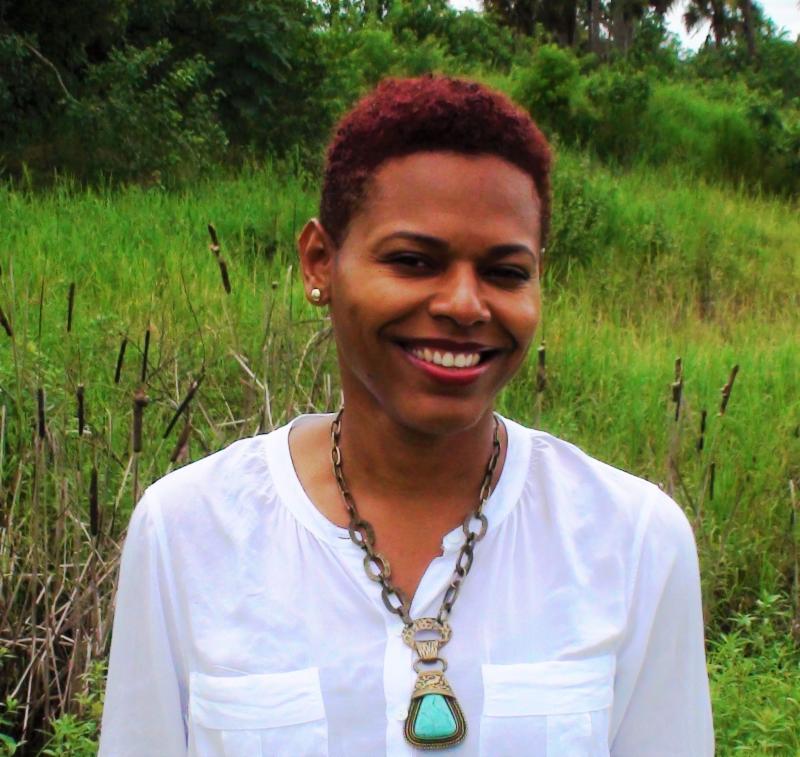 Tara Wade Tara Wade
Tara Wade is
an Agricultural Resource Economist in the Food
and Resource Economics Department and the Southwest Florida Research and Education Center (SWREC). She specializes in determining the economic factors that affect choices to adopt environmentally benign agricultural practices. Tara's research interests are costs of ecosystem services, conservation policy design, and climate change adaptation. Dr. Wade's extension and research programs focus on helping farmers to reach their conservation goals in economically efficient ways.
Before coming to SWREC Tara was a Postdoctoral Research Associate with North Carolina A&T State University and the USDA, Economic Research Service. There she specialized in the economic factors that affect farmers' choices to adopt conservation practices.
Dr. Wade received a master's in Mathematics and a Ph.D. in Energy and Environmental Systems and Economics from North Carolina A&T State University. Her graduate work dealt with estimating the cost of conservation tillage adoption by corn and soybean farmers.
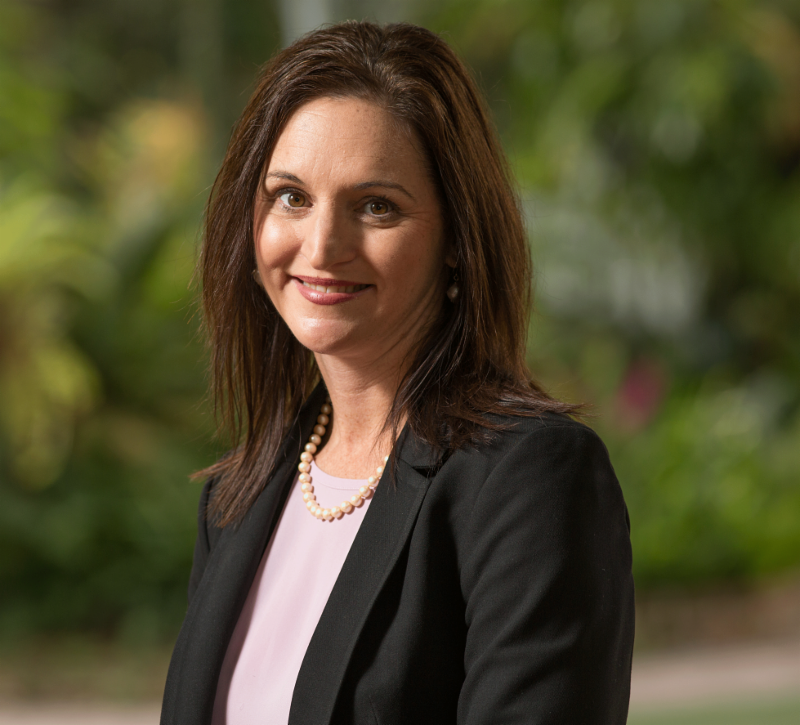 Rachael Smith Rachael Smith
Rachael Smith serves as the Communications Manager of Florida Farm Bureau Federation. Rachael is responsible for preparing articles for print and electronic publications, developing website content, writing press releases and developing strategies for social media and other public outreach initiative to enhance company brand among both internal and external audiences.
Rachael earned her bachelor's degree in Public Relations from Eastern Kentucky University. Her professional experience includes serving as marketing director for a non-profit education foundation and overseeing tourism an economic development functions at a municipal agency. She resides in Gainesville with her husband Scott, and her three children.
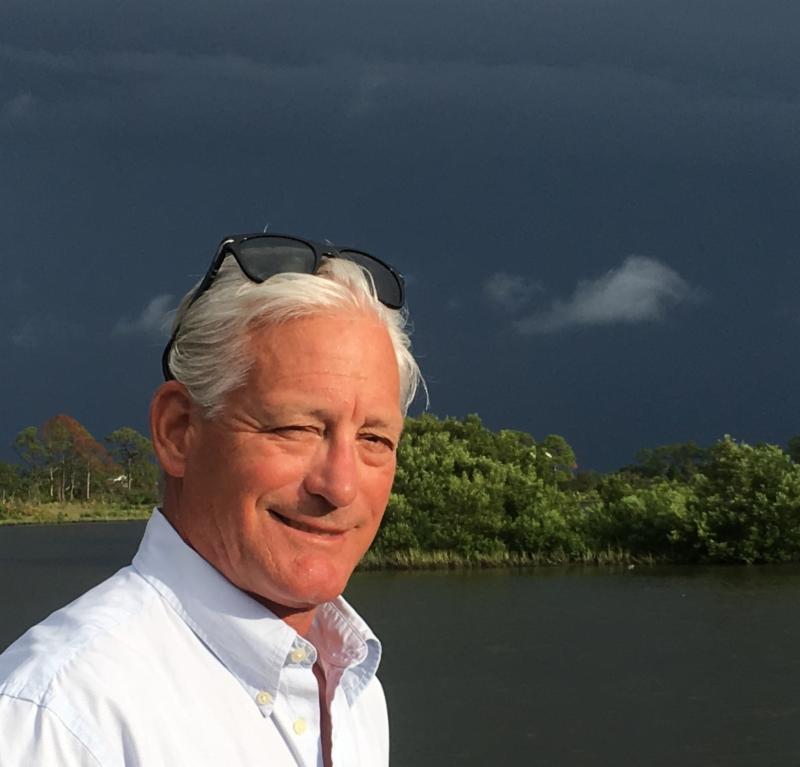 Andrew Gude Andrew Gude
Andrew Gude is the Refuge Manager of the Lower Suwannee and Cedar Keys National Wildlife Refuges (NWRs). He has also managed the Crystal River, Chassahowitzka, and Tampa Bay NWRs. Andrew's interests and skill set lies in building conservation alliances with diverse parties and bridging differences to avoid conflicts around natural resource management issues.
Spending seven years in Washington D.C. with the U.S. Fish and Wildlife Service, allowed Andrew to support a very small team that worked to assist the President's designation of the four, 305 million-acre, Pacific Ocean Marine National Monuments as NWR System-managed areas, expanding the Refuge System by over 200%. His move back to Florida was to be closer to his two children in Sanford, to embrace the rural lifestyle, and spend time on and in the sea. He is happily married to a NRLI alumnus.
While he grew up in southeastern Pennsylvania, he lived throughout the Caribbean, the Florida Keys, Alaska, The Netherlands, the Pacific Northwest, and has spent time in coastal South Carolina, and the Pacific Islands, including over a year on Japanese fishing vessels in the Bering Sea and an Indian Ocean sailboat crossing. Before becoming a federal employee he worked as a fishery biologist, commercially fishing primarily as a breath-hold spear fisher and lobster diver; a diving instructor, captain, fishing guide, an environmental educator, and director of a college study abroad's remote field station in the Turks and Caicos Islands. Becoming a federal employee first for the Army Corps of Engineers, then the U.S. Fish and Wildlife Service's Ecological Service, Andrew worked for the Florida Keys National Wildlife Refuges before he moved to D.C. Andrew's greatest joy is applying an asymmetrical conservation strategy working and supporting local communities such that natural resource-based economies and rural cultural heritage and lifestyles thrive.
|
|
Class XVII Fellows
|
Lisa Aley,
Planning Technical Lead, Restoration Section, Jacksonville District, U.S. Army Corps of Engineers
|
Charles Barrett, Water Resources Regional Specialized Agent, Northeast District, University of Florida/IFAS Extension
|
Brent Bachelder, Fisheries and Wildlife Biological Scientist, Florida Fish and Wildlife Conservation Commission
|
| Katherine Britt, Environmental Specialist III, Florida Department of Environmental Protection, Division of Water Restoration Assistance
|
| Edward Camp, Assistant Professor, Fisheries and Aquatic Sciences, School of Forest Resources and Conservation, University of Florida
|
| Paloma Carton de Grammont, ProForest Coordinator, School of Forest Resources and Conservation, University of Florida |
| John Dooner, Forester, Southern Forestry Consultants, Inc. |
|
Rebecca Elliott,
Environmental Manager, Florida Department of Agriculture and Consumer Services, Office of Agricultural Water Policy
|
| Amy Fenwick Reaume, Conservation Manager, Brevard Zoo |
| Caroline Gorga, Species and Habitat Monitoring Wildlife Legacy Biologist, Florida Fish and Wildlife Conservation Commission |
| Andrew G Gude, Refuge Manager, Lower Suwannee and Cedar Keys National Wildlife Refuges, U.S. Fish & Wildlife Service |
| Derrell Jones, Captain, Florida Fish and Wildlife Conservation Commission |
| Mary Lusk, Water Resources Regional Specialized Agent, South Central District, University of Florida/IFAS Extension |
|
Michael Lusk,
Refuge Manager, Okefenokee National Wildlife Refuge, U.S. Fish and Wildlife Service
|
| Nia Morales, Human Dimensions Specialist, Fish and Wildlife Research Institute |
| Kevin Morris, Science and Technology Officer and Manager of Engineering and Projects, Peace River Manasota Regional Water Supply Authority |
| Rachael Santana, Attorney, Lewis Longman & Walker, P.A. |
|
Elizabeth Ramirez,
Wildlife Biologist, U.S. Forest Service
|
|
Rachael Smith,
Communications Manager, Florida Farm Bureau Federation
|
| Tara Wade, Assistant Professor, Agricultural and Natural Resources Economics, Southwest Florida Research and Education Center, University of Florida/IFAS |
|
Barton Wilder,
Environmental Specialist III, Florida Department of Agriculture and Consumer Services, Office of Agricultural Water Policy
|
| Graham Williams, Land Manager, St. Johns River Water Management District |
|
|
Dates
|
Topic
|
Location
|
|
August 16-18, 2017
|
Water Quality & Estuary Health
|
Ft. Myers
|
|
September 13-15, 2017
|
POSTPONED DUE TO HURRICANE IRMA
|
|
|
October 18-20, 2017
|
Fisheries Management: Red Snapper
(Note: the October session was originally in Miami; we have cancelled the Miami session and will hold the Destin/Fort Walton session during these dates.)
|
Destin/
Fort Walton Beach
|
|
November 15-17, 2017
|
Wildlife Management: The Florida Black Bear
|
Ocala
|
January 17-19, 2018
|
Cattle Ranches & Land Easements
|
Sebring
|
February 14-16, 2018
|
Everglades Restoration & Perspectives from Communities
|
Clewiston
|
March 14-16, 2018
|
Endangered Springs
|
DeLand
|
April 18-20, 2018
|
Graduation & Practicum Presentations
|
Gainesville
|
|
|
|
|